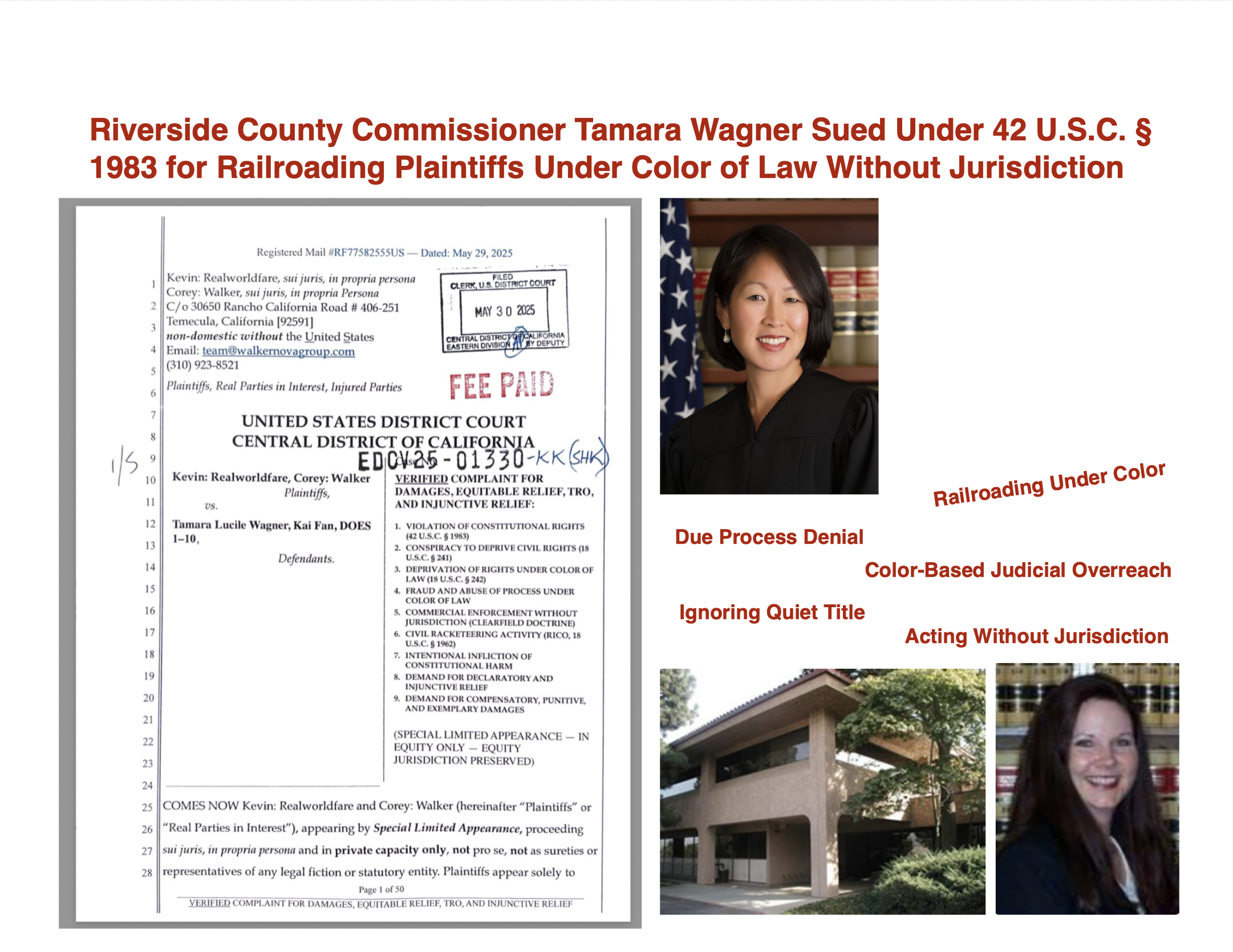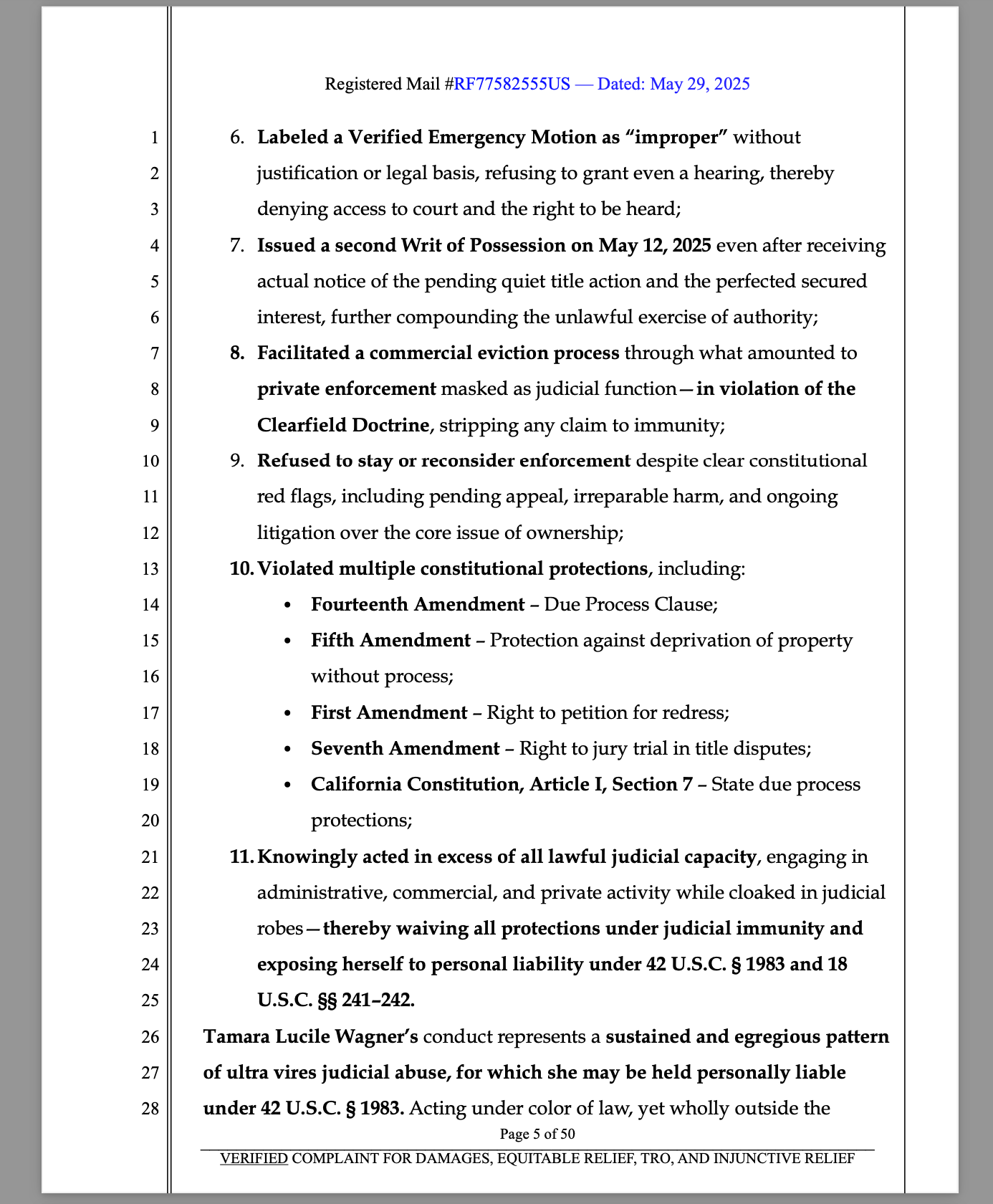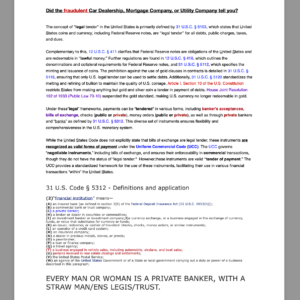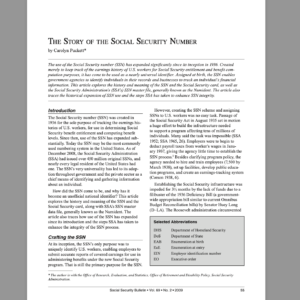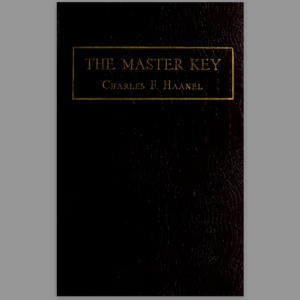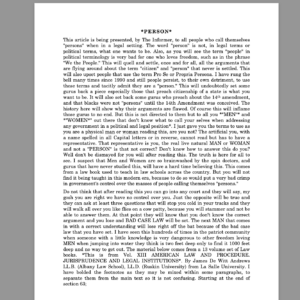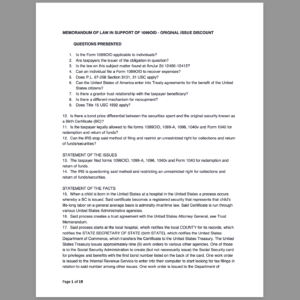In a lawsuit that strikes at the very heart of judicial legitimacy and constitutional order, Plaintiffs Kevin: Realworldfare and Corey: Walker, proceeding sui juris, in propria persona, By Special Limited Appearance only, not pro se, reserving all rights, have filed a Verified Complaint in federal court that reads more like a war crimes report than a civil action. But make no mistake—this is a real legal battle unfolding in real time, and the Plaintiffs are still in possession of their home, despite a multi-front attempt by judicial officer/attorney Tamara Lucile Wagner (BAR #188613) and private actor Kai Fan to circumvent federal supremacy, ignore equity jurisdiction, and trample civil rights under color of law.
The Property: Not Lost, But Defended
The property located at 12232 Brianwood Drive, Riverside, CA is not abandoned, foreclosed, or surrendered. It is lawfully held by the Walker Estate, backed by a duly recorded Grant Deed, perfected UCC-1 and UCC-3 filings, and a series of unrebutted affidavits that now serve as judicially binding facts, unrebutted presumptions, and enforceable judgments in commerce.
Despite this, Defendants are doubling down on what the Complaint calls a “commercial raid disguised as lawful process”—attempting to bulldoze over a pending Quiet Title Action (Case No. CVRI2502206) by pressing ahead with enforcement based on a facially void Trustee’s Deed Upon Sale.
A Fraudulent Script Rehearsed in Court
Tamara Wagner, the named state court judge, is accused of proceeding in total absence of jurisdiction, conducting hearings and issuing a Writ of Possession during the federal removal period, in direct violation of 28 U.S.C. § 1446(d). Evidence includes a voicemail from a court clerk admitting that Wagner ordered proceedings despite being stripped of all jurisdiction.
Wagner’s actions are not merely improper—they are ultra vires, commercial, and according to the Complaint, outside all judicial immunity under the Clearfield Doctrine.
Kai Fan, a private actor, is similarly charged with knowingly initiating a fraudulent unlawful detainer proceeding based on a deed that was not only defective but squarely in dispute in an active equity case. The verified filings show Fan was served with multiple Affidavits of Truth, Security Agreements, Conditional Acceptances, and Notices of Default—all unrebutted, making the facts therein binding under UCC and commercial law.
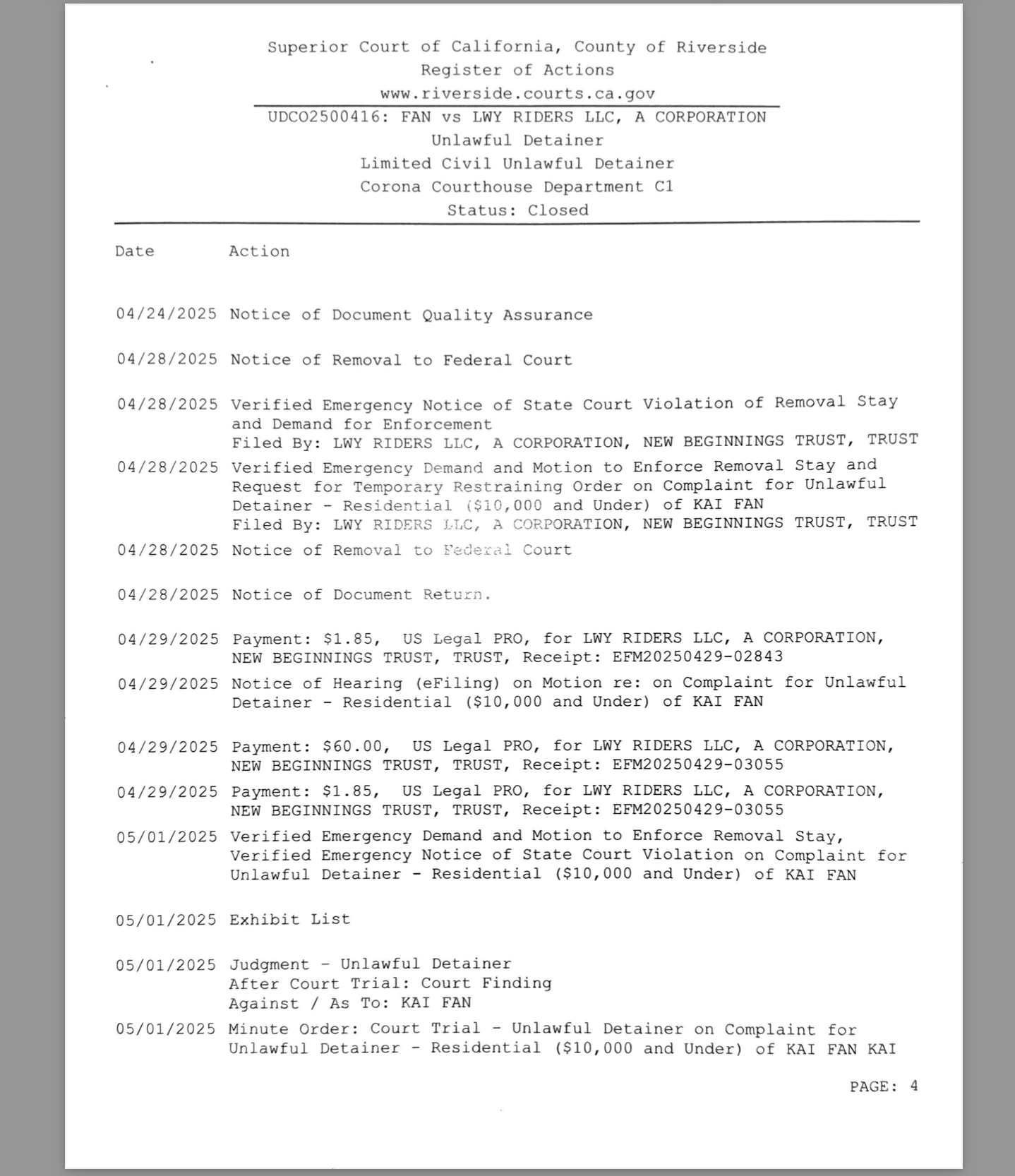
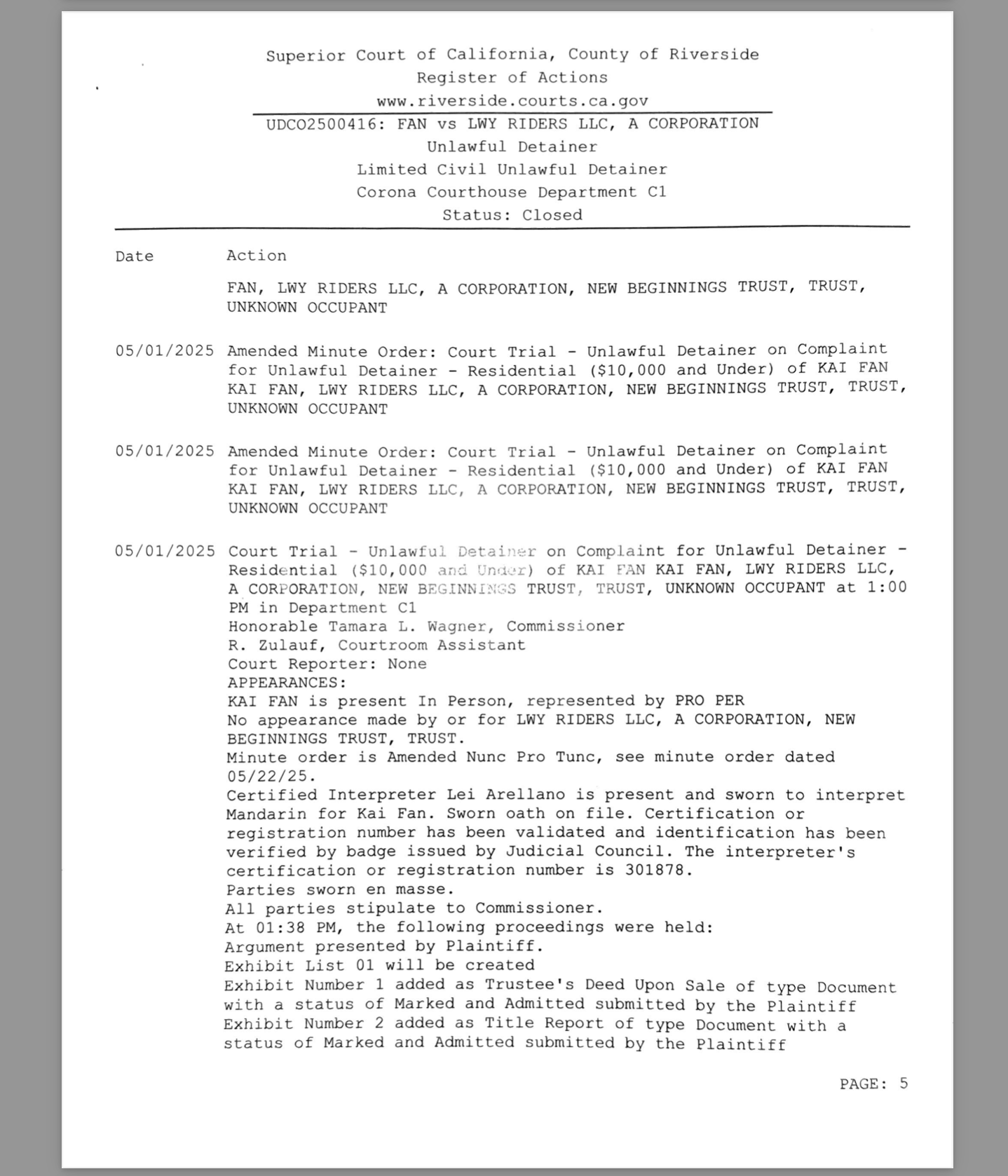

Quiet Title Action: The Elephant in the Courtroom
At the core of the dispute is an active Quiet Title Action that the Defendants are attempting to pretend does not exist. But the record shows otherwise:
-
A verified complaint has been filed and served.
-
Kai Fan and Tamara Wagner had actual and constructive notice.
-
Jurisdiction over title disputes is exclusive to quiet title proceedings—not summary unlawful detainer actions.
To proceed in spite of this is to ignore stare decisis, violate res judicata, and trample the equitable principle that “equity regards that as done which ought to be done.”
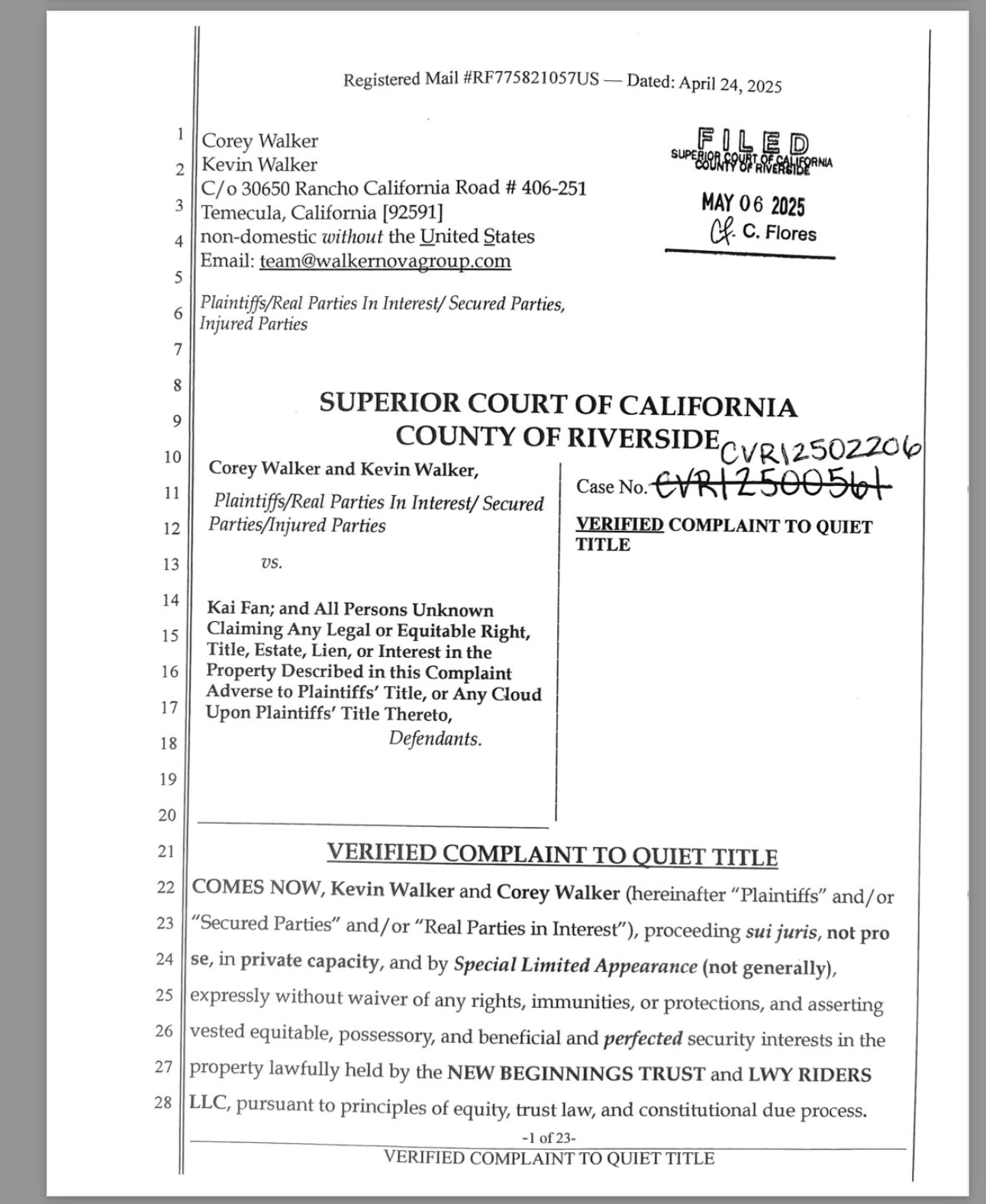
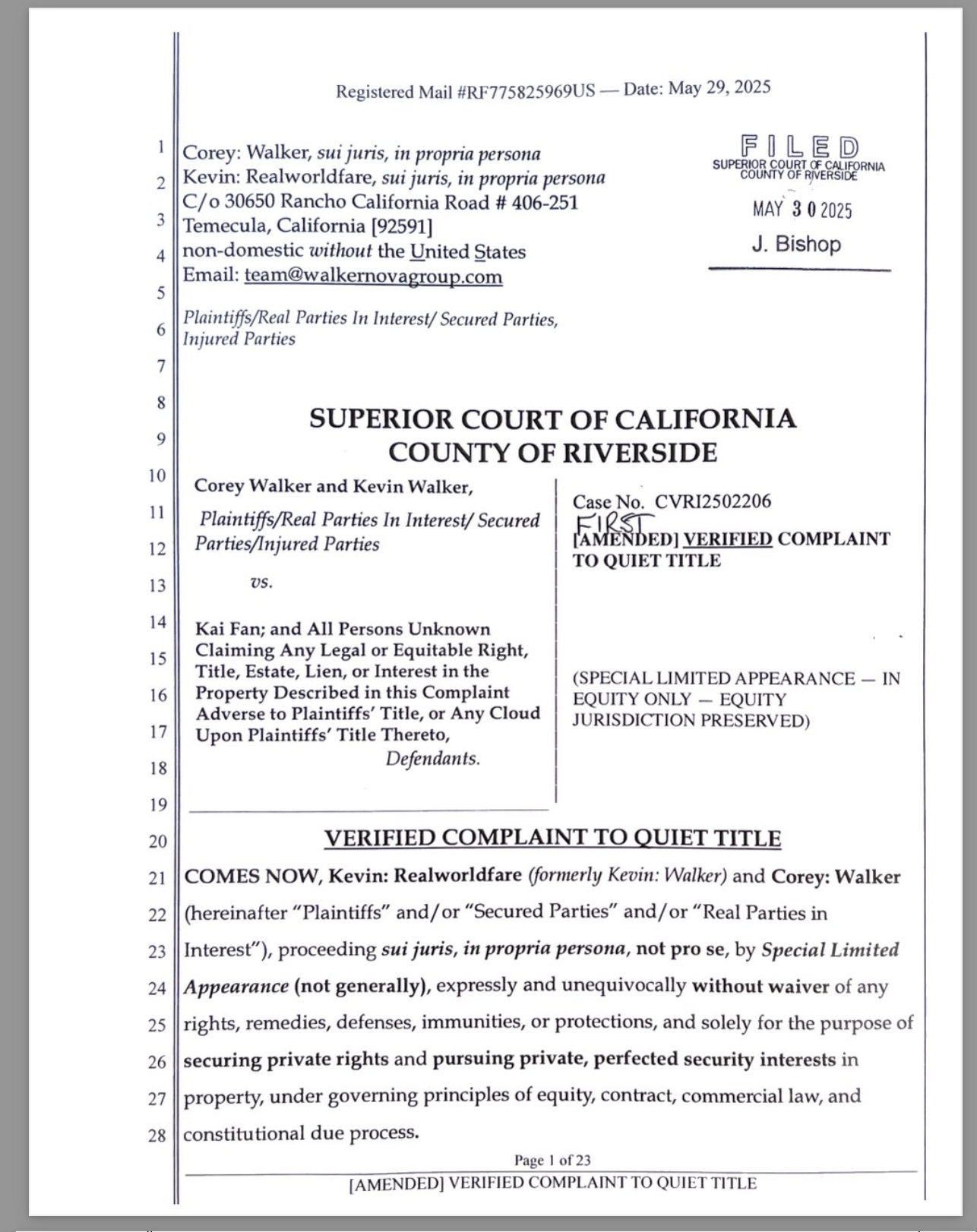
Binding Record, Binding Judgment
With no rebuttals on record, the unrebutted affidavits stand as:
-
Facts in law
-
Confessions of judgment by silence (tacit procuration)
-
Commercial defaults
-
Estoppel against any future contradiction of those facts
Every attempt by the Defendants to enforce a void deed, bypass a valid quiet title action, or sidestep perfected filings is now legally barred, unless fraudulently executed again under force.
Legal Firepower: RICO, Civil Rights, and Equity Combined
Plaintiffs have asserted claims under:
-
42 U.S.C. § 1983 – civil rights violations under color of law
-
18 U.S.C. §§ 241, 242 – conspiracy and deprivation of rights
-
18 U.S.C. § 1962 – RICO violations for a coordinated pattern of racketeering
-
Common law fraud, abuse of process, and constructive trespass
-
The Clearfield Doctrine – stripping immunity from state actors acting in private/commercial capacities
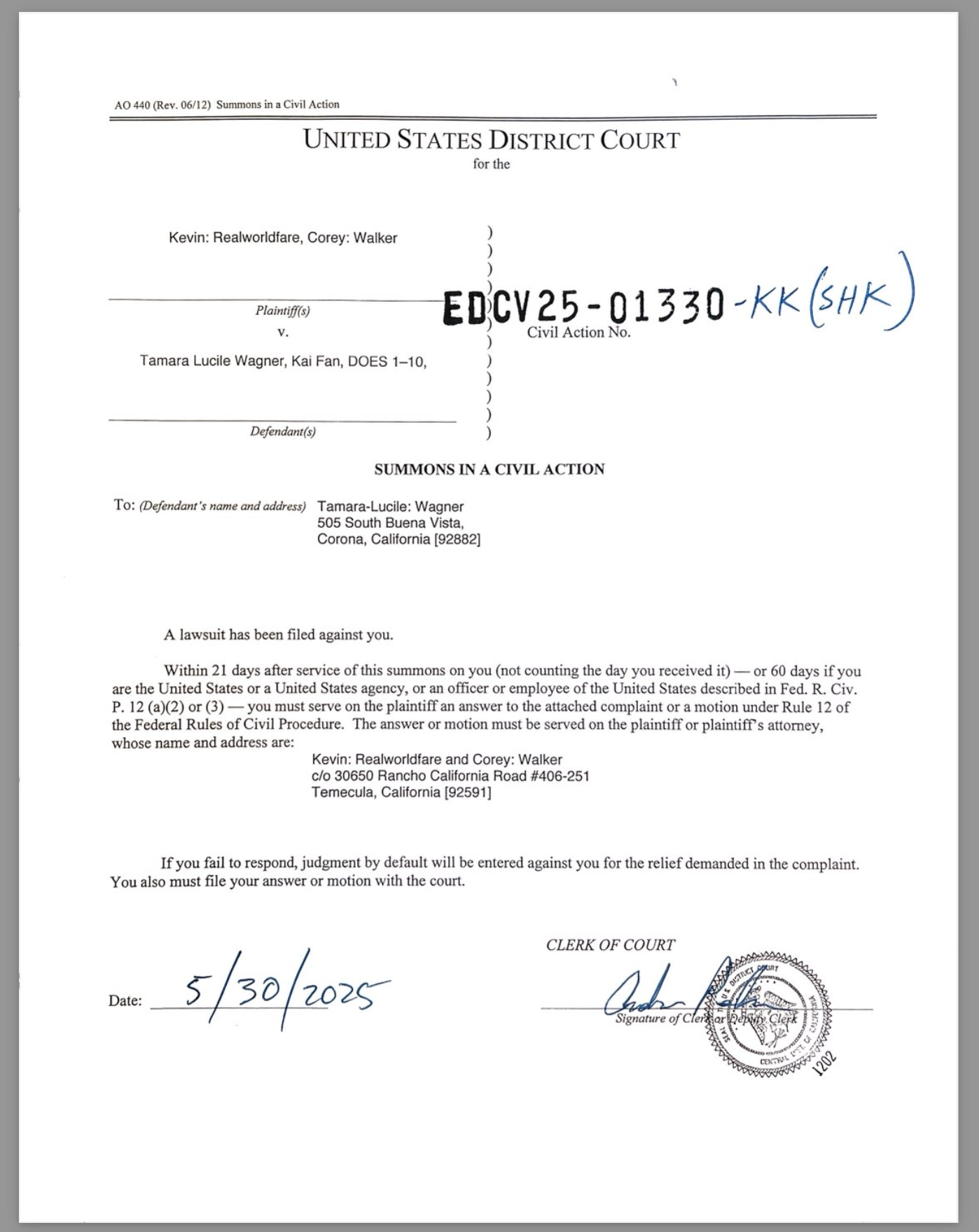
Kevin_Realworldfare_et_al_v_Tamara_Lucile_Wagner_et_al__cacdce-25-01330__0001.0.pdf
LEGAL MAXIMS & CASE LAW: ABSENCE OF JURISDICTION RENDERS ALL ACTIONS VOID
It is a foundational principle of both state and federal law that when a court acts without jurisdiction, its orders and judgments are void, not merely voidable. The judicial actions undertaken by Tamara Lucile Wagner—while a Quiet Title Action was pending and federal removal was perfected—are therefore legally null and constitutionally defective.
I. ALL JUDICIAL ACTIONS WITHOUT JURISDICTION ARE VOID
“A judgment rendered by a court without jurisdiction is a nullity. It is not entitled to the respect accorded judgments of courts with jurisdiction. It is entitled to no effect whatsoever.”
— Ex parte Reed, 100 U.S. 13, 23 (1879)
“Where there is no jurisdiction over the subject matter, there is no authority to pronounce any judgment, and any judgment so rendered is absolutely void.”
— Thompson v. Whitman, 85 U.S. 457, 470 (1873)
“A court must have both subject matter jurisdiction and personal jurisdiction before it can act. If it proceeds without these, its actions are void and open to collateral attack.”
— Burnham v. Superior Court, 495 U.S. 604, 609 (1990)
“A void judgment is one which, from its inception, is a complete nullity and without legal effect.”
— Valerio v. Boise Cascade Corp., 80 Cal. App. 3d 772, 785 (1978)
“No judge or court has the power to render a judgment or order in a cause over which it has no jurisdiction, and any attempt to do so is null and void.”
— People v. American Contractors Indemnity Co., 33 Cal. 4th 653, 660 (2004)
II. FEDERAL REMOVAL STRIPS STATE COURT OF JURISDICTION IMMEDIATELY
“After the filing of a notice of removal in the federal court and the filing of a copy thereof in the state court, the latter shall proceed no further unless and until the case is remanded.”
— 28 U.S.C. § 1446(d)
“The filing of the removal petition in the federal court, together with a copy in the state court, automatically divests the state court of jurisdiction.”
— Ackerman v. ExxonMobil Corp., 734 F.3d 237, 249 (4th Cir. 2013)
“Any orders entered by the state court after removal are void ab initio.”
— Maseda v. Honda Motor Co., Ltd., 861 F.2d 1248, 1254 (11th Cir. 1988)
III. STATE UNLAWFUL DETAINER COURTS HAVE NO POWER TO ADJUDICATE TITLE DISPUTES
“The summary proceeding of unlawful detainer may not be used to resolve questions of title to real property.”
— Asuncion v. Superior Court, 108 Cal. App. 3d 141, 146 (1980)
“Where the right to possession turns on the validity of title and that title is in dispute, the unlawful detainer court lacks jurisdiction and the matter must be heard in a quiet title action.”
— Martin-Bragg v. Moore, 219 Cal. App. 4th 367, 385 (2013)
“An unlawful detainer action cannot proceed where the defendant raises a title dispute that is not wholly unsubstantial or frivolous.”
— Cheney v. Trauzettel, 9 Cal. 2d 158, 160–61 (1937)
IV. ONCE TITLE IS DISPUTED AND A QUIET TITLE ACTION IS FILED, ALL OTHER PROCEEDINGS MUST HALT
“A quiet title action is the appropriate remedy to adjudicate competing claims of title. Any proceedings inconsistent with its exclusive jurisdiction are improper and void.”
— Pedersen v. Superior Court, 215 Cal. App. 4th 1348, 1359 (2013)
“A court must first resolve a title dispute before issuing possessory relief. To do otherwise violates due process.”
— Evans v. Superior Court, 67 Cal. App. 3d 162, 169 (1977)
“Equity will not allow procedural form to override substantive right—especially where one party attempts to seize possession while a title action is pending.”
— Caira v. Offner, 126 Cal. App. 4th 12, 23 (2005)
V. JUDGES ACTING WITHOUT JURISDICTION ARE PERSONALLY LIABLE
“Judges are not immune when they act in clear absence of all jurisdiction.”
— Stump v. Sparkman, 435 U.S. 349, 356–57 (1978)
“Judicial immunity is lost where the judge acts without subject matter jurisdiction.”
— Rankin v. Howard, 633 F.2d 844, 848 (9th Cir. 1980)
“Acts done by judges in the clear absence of all jurisdiction are treated as private acts and are not judicial functions.”
— Mireles v. Waco, 502 U.S. 9, 11–12 (1991)
CONCLUSION
Judge Wagner’s issuance and enforcement of a Writ of Possession:
-
While a Quiet Title Action was pending;
-
During a perfected federal removal period;
-
In the face of multiple unrebutted jurisdictional objections and perfected UCC filings;
is void ab initio as a matter of law.
Any claim of jurisdiction is extinguished by the dual facts of federal removal and equity-based title litigation. These principles are not optional—they are binding upon every court in the United States. The state court was divested of power. Wagner proceeded in defiance of the law. The judgment is not erroneous; it is void.
Federal Oversight Activated: Judge Kato Presiding Over Live Matter
Despite the attempted railroading in the state forum, the matter has now escalated to the federal level where U.S. District Judge Kenly Kiya Kato has been assigned to preside over the case. The Verified Complaint—filed in the Central District of California, Eastern Division—remains active and pending, with no dismissal, closure, or resolution entered as of this writing.
This development reinforces two critical points:
-
Federal jurisdiction is intact and ongoing, triggered by well-pleaded claims involving constitutional violations, civil rights deprivations, and ultra vires judicial actions under color of law;
-
The plaintiffs’ rights to equitable relief, commercial remedy, and constitutional protection are not extinguished, and are now squarely under the jurisdiction of an Article III court with the power to grant injunctive relief, declaratory findings, and civil penalties.
Any parallel or subsequent action by state officers—including enforcement of void writs, evictions, or administrative retaliation—may constitute obstruction of federal jurisdiction and contempt of federal court authority.
This case is not over. It is very much alive—on the federal docket, under Article III supervision, and backed by an evidentiary record that most state cases never survive long enough to compile. Judge Kato now holds the gavel—and with it, the constitutional obligation to halt the rogue actions still attempting to masquerade as lawful process.
Still Standing. Still Sovereign.
The Walker Estate remains in lawful, secured possession of the property, and no lawful order has been entered that extinguishes that right. All attempted enforcement actions are void for lack of jurisdiction, lack of standing, and fatal procedural defects.
The Message to Rogue Officials?
Due process is not optional. Equity is not beneath you. And immunity does not cover fraud. As the federal court now takes up the matter, the question becomes not whether the Plaintiffs have a right to their home—it’s whether the system can admit the extent of its own abuse before being publicly dismantled.
